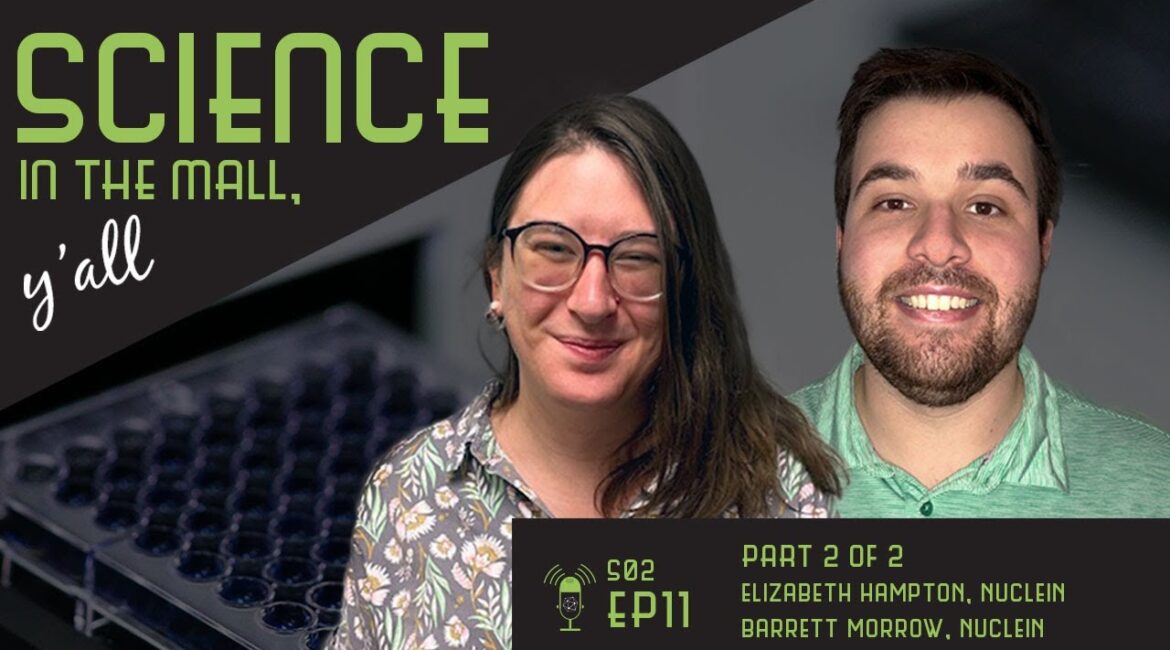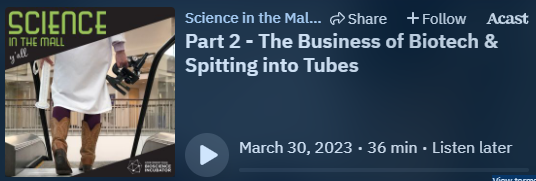- What you’ll hear in this episode:
- Why you should apply for the job, even if you only meet a third of the requirements
- The importance of of coupling education with hands-on experience
- A description of intersection between business and biotech
- Exploring how to monetize cool ideas in science
What’s more important than skills and knowledge? A good attitude and a willingness and desire to learn and grow. People can be trained, but those innate qualities aren’t quite as easy to come by.
For part two of their conversation, Liz and Barrett get into why some of the things that can’t be neatly summed up on your resume are some of the most important indicators of a good hire.
Barrett was part of the hiring team that brought Liz on board at Nuclein after her ABI internship. They offer insights into what the process was like on both sides of the interview table, and Barrett describes what hiring teams are really looking for in a candidate for entry-level positions in bioscience.
Resumes are a qualifier, so if you’ve made it to the interview, your focus should be on other things, like being professional, showing you have grit and dedication, and making an effort to look nice and make a good impression.
If you’re wondering if you’re qualified, or questioning whether you should still apply for a position even if you don’t tick all the requirement boxes, you can follow Liz’s dad’s advice. He told her to just apply for the job. She says, “the worst thing that can happen is that they don’t respond at all. The second worst is that they say ‘no.’”
Barrett’s advice is, “If you meet even one third of the credentials, just go ahead and apply.”
Because, not only can you be trained — you will be trained to use the company-specific tools and procedures. It’s important to remember that job descriptions are written by people, just like you, who are making educated guesses at the boundaries of the position and the skill-set needed to perform the job. As such, they aren’t comprehensive, so don’t be discouraged if you don’t perfectly meet the listed requirements.
Barrett and Liz also get into a discussion on higher education, and its role in preparing people for careers in the biosciences. After taking a break during the pandemic, Liz chose to return to school to pursue a degree in biochemistry, and now splits her time between the classroom and her job at Nuclein — decision which the people at Nuclein encouraged. As her work and education complement one another, Liz says that for her, school is a “good tool.”
And for her, of course, it started at ABI, as did Nuclein in its incubation stage. For both Liz and the start-up, access to ABI’s labs and equipment was instrumental in helping them get from where they started to where they are now. The hands-on experience Liz got at ABI allowed her to learn to use incredible technology she wouldn’t have had access to otherwise, and that ultimately helped her land her job at Nuclein.
Listen to the full episode, which is part two of Liz and Barrett’s conversation, to hear more about ACC’s Bioscience Incubator, how it helped both Nuclein and Liz get their starts, and how they not only help develop the knowledge and skills that go on your resume, but also nurture those other qualities that can help you land the job.
If you missed it, click here to listen to part one of Liz and Barrett’s chat.
If you liked the episode, don’t forget to like, subscribe, and share it with a friend!
Science In the Mall, Y’all is a founding_media podcast created in partnership with the ACC Bioscience Incubator.
Host: Dan Dillard, founding_media
Guests: Nancy Lyon, ACC Bioscience Incubator Director
Liz Hampton, Nuclein
Barrett Morrow, Nuclein








